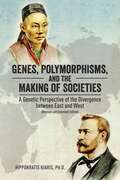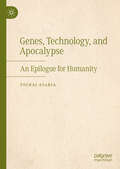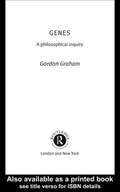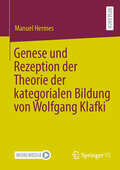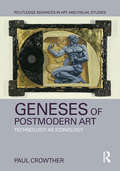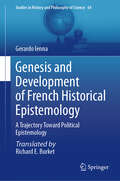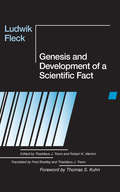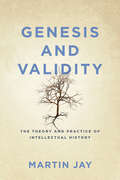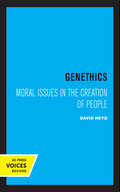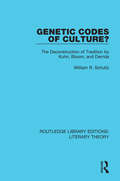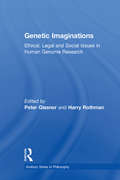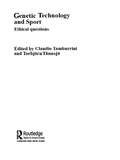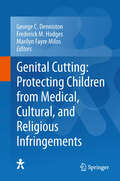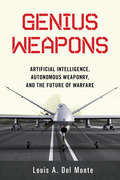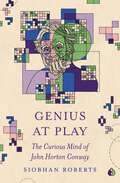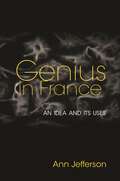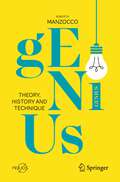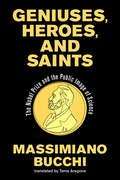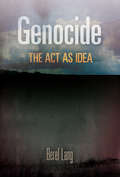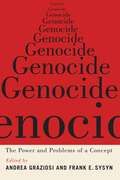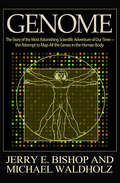- Table View
- List View
Genes, Polymorphisms, and the Making of Societies: A Genetic Perspective of the Divergence between East and West (Revised and Extended Edition)
by Hippokratis KiarisOur genes determine to a large extent who we are and why we are different from others. In this book, Hippokratis Kiaris explores how various genetic polymorphisms in different ethnic populations may affect the development of distinct cultures and eventual
Genes, Technology, and Apocalypse: An Epilogue for Humanity
by Yochai AtariaThis book offers a critique of a certain contemporary discourse in popular science that consists of (1) identifying the origins and therefore essential nature of Homo Sapiens; and (2) identifying the nature of technology. The author’s critique is that this double gesture generates a deterministic worldview – man is evil and technology has its own necessity – that operates to exonerate humanity from responsibility to the horrors of the 20th century, epitomized in Auschwitz and Hiroshima, for example. The author situates this operation within what he identifies as an “apocalyptical-eschatological state of mind”. Yochai Ataria explains that the dynamics of technology and the quest for the first human are the two central vectors shaping both scientific and popular discourse today, highlighting the importance of understanding the deep connection between the two.
Genes: Yeast Gene Analysis (Methods In Microbiology Ser. #Vol. 26)
by Gordon Graham'It's all in the genes'. Is this true, and if so, what is all in the genes? Genes: A Philosophical Inquiry is a crystal clear and highly informative guide to a debate none of us can afford to ignore.Beginning with a much-needed overview of the relationship between science and technology, Gordon Graham lucidly explains and assesses the most important and controversial aspects of the genes debate: Darwinian theory and its critics, the idea of the 'selfish' gene, evolutionary psychology, memes, genetic screening and modification, including the risks of cloning and 'designer' babies.He considers areas often left out of the genes debate, such as the environmental risks of genetic engineering and how we should think about genes in the wider context of debates on science, knowledge and religion. Gordon Graham asks whether genetic engineering might be introducing God back into the debate and whether the risks of a brave new genetic world outweigh the potential benefits.Essential reading for anyone interested in science, technology, and philosophy, Genes: A Philosophical Inquiry is ideal for those wanting to find out more about the ethical implications of genetics and the future of biotechnology.
Genese und Rezeption der Theorie der kategorialen Bildung von Wolfgang Klafki
by Manuel HermesWolfgang Klafki ist einer der zentralen deutschen Erziehungswissenschaftler in der zweiten Hälfte des 20. Jahrhunderts. Seine 1959 publizierte Dissertation über "Das pädagogische Problem des Elementaren und die Theorie der kategorialen Bildung" etablierte ihn mit einem Schlag in der ersten Riege der Erziehungswissenschaft der jungen Bundesrepublik. Weitgehend unbekannt ist bis heute, dass und inwiefern er seine Theorie der kategorialen Bildung bereits in der erst 2013 veröffentlichten Staatsexamensarbeit von 1951 ausgearbeitet hat. Die Studie von Manuel Hermes nimmt ihren Ausgang von jener frühesten Arbeit Klafkis und zeichnet von dort aus die Genese der Theorie der kategorialen Bildung in ihrer ursprünglichen Entstehung und werkimmanenten Entwicklung von 1951 bis 2007 nach. Im Anschluss daran untersucht Hermes die erziehungswissenschaftliche und didaktische Rezeption der Theorie der kategorialen Bildung. Er legt damit ein unverzichtbares Standardwerk für jede künftige Forschung zum Thema vor.
Geneses of Postmodern Art: Technology As Iconology (Routledge Advances in Art and Visual Studies)
by Paul CrowtherPostmodernism in the visual arts is not just another 'ism.' It emerged in the 1960s as a transformation of artistic creativity inspired by Duchamp's idea that the artwork does not have to be physically made by its creator. Products of mass culture and technology can be used just as well as traditional media. This idea became influential because of a widespread naturalization of technology - where technology becomes something lived in as well as used. Postmodern art embodies this attitude. To explain why, Paul Crowther investigates topics such as eclecticism, the sublime, deconstruction in art and philosophy, and Paolozzi's Wittgenstein-inspired works.
Genesis and Development of French Historical Epistemology: A Trajectory Toward Political Epistemology (Studies in History and Philosophy of Science #64)
by Gerardo IennaThis book forms an important part of the current revival of the debate around the category of historical epistemology. The term “historical epistemology” designates a methodology or research program aimed at building a historically informed theory of knowledge and/or a history of science and technology that enhances its epistemological aspects. This book offers an original panorama of the French debate surrounding the emergence and consolidation of the intellectual program of historical epistemology over a period ranging from the end of the 19th century to the second half of the 20th century. The first section of this book sets out to reconstruct sociologically and historically the processes of circulation of ideas - both nationally and internationally - that constituted the conditions of possibility for the emergence of the very idea of historical epistemology in the French intellectual context. The second section aims instead to highlight the main theoretical positions - both epistemological and historiographical - that would make it possible to trace a relative unity of intent among the authors who make up the canon of historical epistemology (in their oppositional relationship to other intellectual trends). Particular attention is also paid to defining a “minor canon” of this tradition, represented by what is known as “mathematical thought”. The third part of the volume focuses instead on reconstructing the anthropological, sociological and political perspectives underlying the methodology employed by authors belonging to historical epistemology. The three parts combined make for a uniquely broad yet focused book that is of interest to historians, philosophers and scientists alike.
Genesis and Development of a Scientific Fact
by Ludwik Fleck; edited by Thaddeus J. Trenn and Robert K. Merton; translated by Fred Bradley and Thaddeus J. TrennOriginally published in German in 1935, this monograph anticipated solutions to problems of scientific progress, the truth of scientific fact and the role of error in science now associated with the work of Thomas Kuhn and others. Arguing that every scientific concept and theory—including his own—is culturally conditioned, Fleck was appreciably ahead of his time. And as Kuhn observes in his foreword, "Though much has occurred since its publication, it remains a brilliant and largely unexploited resource." "To many scientists just as to many historians and philosophers of science facts are things that simply are the case: they are discovered through properly passive observation of natural reality. To such views Fleck replies that facts are invented, not discovered. Moreover, the appearance of scientific facts as discovered things is itself a social construction, a made thing. A work of transparent brilliance, one of the most significant contributions toward a thoroughly sociological account of scientific knowledge."—Steven Shapin, Science
Genesis and Validity: The Theory and Practice of Intellectual History.
by Martin JayThere is no more contentious and perennial issue in the history of modern Western thought than the vexed relationship between the genesis of an idea and its claim to validity beyond it. Can ideas or values transcend their temporal origins and overcome the sin of their original context, and in so doing earn abiding respect for their intrinsic merit? Or do they inevitably reflect them in ways that undermine their universal aspirations? Are discrete contexts so incommensurable and unique that the smooth passage of ideas from one to the other is impossible? Are we always trapped by the limits of our own cultural standpoints and partial perspectives, or can we somehow escape their constraints and enter into a fruitful dialogue with others?These persistent questions are at the heart of the discipline known as intellectual history, which deals not only with ideas, but also with the men and women who generate, disseminate, and criticize them. The essays in this collection, by one of the most recognized figures in the field, address them through engagement with leading intellectual historians—Hans Blumenberg, Quentin Skinner, Hayden White, Isaiah Berlin, Frank Ankersmit—as well other giants of modern thought—Max Weber, Emile Durkheim, Georg Simmel, Walter Benjamin, Theodor Adorno, and Georg Lukács. They touch on a wide variety of related topics, ranging from the heroism of modern life to the ability of photographs to lie. In addition, they explore the fraught connections between philosophy and theory, the truth of history and the truthfulness of historians, and the weaponization of free speech for other purposes.
Genethics: Moral Issues in the Creation of People
by David HeydUnprecedented advances in medicine, genetic engineering, and demographic forecasting raise new questions that strain the categories and assumptions of traditional ethical theories. Heyd's approach resolves many paradoxes in intergenerational justice, while offering a major test case for the profound problems of the limits of ethics and the nature of value. This title is part of UC Press's Voices Revived program, which commemorates University of California Press’s mission to seek out and cultivate the brightest minds and give them voice, reach, and impact. Drawing on a backlist dating to 1893, Voices Revived makes high-quality, peer-reviewed scholarship accessible once again using print-on-demand technology. This title was originally published in 1992.
Genetic Codes of Culture?: The Deconstruction of Tradition by Kuhn, Bloom, and Derrida (Routledge Library Editions: Literary Theory #24)
by William R. SchultzIn this text, first published in 1994, the author examines the interdisciplinary significance of the theory of science, literature and philosophy according to the figures who achieved prominence in those fields - Kuhn, Bloom and Derrida. Each scholar's theory is discussed in terms of its major concepts, and the book then relates their fields within the context of deconstruction's interdisciplinary movement. This title will be of interest to students of literature and philosophy.
Genetic Codes of Culture?: The Deconstruction of Tradition by Kuhn, Bloom, and Derrida (Routledge Library Editions: Literary Theory)
by William R. SchultzIn this text, first published in 1994, the author examines the interdisciplinary significance of the theory of science, literature and philosophy according to the figures who achieved prominence in those fields - Kuhn, Bloom and Derrida. Each scholar's theory is discussed in terms of its major concepts, and the book then relates their fields within the context of deconstruction's interdisciplinary movement. This title will be of interest to students of literature and philosophy.
Genetic Counselling: Practice and Principles (Professional Ethics)
by Angus ClarkeContributions to this study are drawn both from health professionals engaged in genetic counselling and from observers and critics with backgrounds in law, philosophy, biology, and the social sciences. This diversity will enable health professonals to examine their activities with a fresh eye, and will help the observer-critic to understand the ethical problems that arise in genetic counselling practice, rather than in imaginary encounters. Most examinations of the ethical issues raised by genetics are concerned in a broad sense with the application of new technology to human reproduction. This volume focuses on genetic counselling and screening as such, providing valuable insights for the health professional, social scientist, philosopher, lawyer, and bioethicist.
Genetic Imaginations: Ethical, Legal and Social Issues in Human Genome Research (Avebury Series in Philosophy)
by Peter Glasner Harry RothmanThe title of this book derives from C. Wright Mills’ classic The Sociological Imagination (Penguin, 1970), in which he sees the essential project of social science as the use of the imagination to 'grasp history and biography and the relations between the two in society'. This enables the social scientist to 'range from the most impersonal and remote transformations to the most intimate features of the human self'. Another of Mills’ concerns was the relationship between 'the personal troubles of the milieu' and 'the public issues of social structure' and these are most acutely illustrated in human genetics, the most personal of the new technologies. The chapters in this volume address these issues through discussions of choice and informed decision-making, risks and hazards, the economic and political organization of new technology, and the public as well as the scientist’s understanding of science. The methods used range from detailed ethnographies, through deconstruction's of text and action, to surveys and interviews.
Genetic Technology and Sport: Ethical Questions (Ethics and Sport)
by Torbjörn Tännsjö Claudio TamburriniWill the genetic design of athletes destroy sport … or will it lead to a new and extraordinary age of athletic achievement? Exploring a new territory in sport and ethics, this edited collection contains some of the best new writing that has emerged from the debates concerning the uses of genetic technologies to improve sport performance. Issues covered include: * gene technology and sports ethics* genetic testing in sports* gene technology and the sporting ethos* gene technology and gender equality in sport. This cutting-edge text is the first on the subject to analyze gender specific questions that arise from genetically modified sport and is likely to provoke further debate in the world of sport and bio-ethics. Contributors include Lincoln Allison, Ruth Chadwick, Arne Ljungqvist, Andy Miah, Christian Munthe, Bengt Saltin, Angela Schnieder and many more.
Geniale Frauen in der Wissenschaft: Versteckte Beiträge, die die Welt verändert haben
by Lars JaegerObwohl Frauen schon früh das wissenschaftliche Denken mitgeprägt haben, sichtbar geworden sind sie fast nie. Dieses Ungleichgewicht setzt sich bis heute fort, auch wenn es aktuell weit mehr Wissenschaftlerinnen gibt als jemals zuvor. Lars Jaeger spannt einen Bogen von der Antike bis heute und porträtiert in essayartigen Einführungen das Leben und Wirken der wohl bedeutendsten weiblichen Naturwissenschaftlerinnen und Mathematikerinnen. Von Hypatia von Alexandria über Émilie du Châtelet und Emmy Noether bis hin zu Lisa Randall, sie alle haben Großes geleistet, die Wissenschaft entscheidend vorangebracht und konnten dennoch oft nicht aus dem Schatten ihrer männlichen Kollegen treten.Neben den spannenden Porträts der einzelnen Wissenschaftlerinnen sowie einer detaillierten und anschaulichen Darstellung ihrer wissenschaftlichen Leistungen beleuchtet dieses Sachbuch auch das Geschlechterverhältnis in der Wissenschaft, das sich nur quälend langsam zugunsten eines fairen Verhältnisses für die Frauen entwickelt.
Genital Cutting: Protecting Children from Medical, Cultural, and Religious Infringements
by Frederick M. Hodges Marilyn Fayre Milos George C. DennistonThis volume contains the proceedings of the 10th International Symposium on Circumcision, Genital Integrity, and Human Rights. Authors are international experts in their fields, and the book contains the most up-to-date information on the issue of genital cutting of infants and children from medical, legal, bioethical, and human rights perspectives.
Genius Weapons: Artificial Intelligence, Autonomous Weaponry, and the Future of Warfare
by Louis A. Del MonteA technology expert describes the ever-increasing role of artificial intelligence in weapons development, the ethical dilemmas these weapons pose, and the potential threat to humanity.Artificial intelligence is playing an ever-increasing role in military weapon systems. Going beyond the bomb-carrying drones used in the Afghan war, the Pentagon is now in a race with China and Russia to develop "lethal autonomous weapon systems" (LAWS). In this eye-opening overview, a physicist, technology expert, and former Honeywell executive examines the advantages and the potential threats to humanity resulting from the deployment of completely autonomous weapon systems. Stressing the likelihood that these weapons will be available in the coming decades, the author raises key questions about how the world will be impacted. Though using robotic systems might lessen military casualties in a conflict, one major concern is: Should we allow machines to make life-and-death decisions in battle? Other areas of concern include the following: Who would be accountable for the actions of completely autonomous weapons--the programmer, the machine itself, or the country that deploys LAWS? When warfare becomes just a matter of technology, will war become more probable, edging humanity closer to annihilation? What if AI technology reaches a "singularity level" so that our weapons are controlled by an intelligence exceeding human intelligence?Using vivid scenarios that immerse the reader in the ethical dilemmas and existential threats posed by lethal autonomous weapon systems, the book reveals that the dystopian visions of such movies as The Terminator and I, Robot may become a frightening reality in the near future. The author concludes with concrete recommendations, founded in historical precedent, to control this new arms race.
Genius at Play: The Curious Mind of John Horton Conway
by Siobhan RobertsA multifaceted biography of a brilliant mathematician and iconoclastA mathematician unlike any other, John Horton Conway (1937–2020) possessed a rock star&’s charisma, a polymath&’s promiscuous curiosity, and a sly sense of humor. Conway found fame as a barefoot professor at Cambridge, where he discovered the Conway groups in mathematical symmetry and the aptly named surreal numbers. He also invented the cult classic Game of Life, a cellular automaton that demonstrates how simplicity generates complexity—and provides an analogy for mathematics and the entire universe. Moving to Princeton in 1987, Conway used ropes, dice, pennies, coat hangers, and the occasional Slinky to illustrate his winning imagination and share his nerdish delights. Genius at Play tells the story of this ambassador-at-large for the beauties and joys of mathematics, lays bare Conway&’s personal and professional idiosyncrasies, and offers an intimate look into the mind of one of the twentieth century&’s most endearing and original intellectuals.
Genius in France: An Idea and Its Uses
by Ann JeffersonThis engaging book spans three centuries to provide the first full account of the long and diverse history of genius in France. Exploring a wide range of examples from literature, philosophy, and history, as well as medicine, psychology, and journalism, Ann Jefferson examines the ways in which the idea of genius has been ceaselessly reflected on and redefined through its uses in these different contexts. She traces its varying fortunes through the madness and imposture with which genius is often associated, and through the observations of those who determine its presence in others.Jefferson considers the modern beginnings of genius in eighteenth-century aesthetics and the works of philosophes such as Diderot. She then investigates the nineteenth-century notion of national and collective genius, the self-appointed role of Romantic poets as misunderstood geniuses, the recurrent obsession with failed genius in the realist novels of writers like Balzac and Zola, the contested category of female genius, and the medical literature that viewed genius as a form of pathology. She shows how twentieth-century views of genius narrowed through its association with IQ and child prodigies, and she discusses the different ways major theorists—including Sartre, Barthes, Derrida, and Kristeva—have repudiated and subsequently revived the concept.Rich in narrative detail, Genius in France brings a fresh approach to French intellectual and cultural history, and to the burgeoning field of genius studies.
Genius: Theory, History and Technique (Springer Praxis Books)
by Roberto ManzoccoGenius is a fascinating topic. Everyone has an opinion on it, but not a lot of clarity. Much has been written on the subject - biographies, autobiographies, technical books, popular science books, and practical manuals - but genius in all of its dimensions has yet to be addressed. This book seeks to remedy that. What follows is a work of significant breadth that hopes to facilitate a nuanced popular understanding of the definition of genius, examining all of the main theories and approaches regarding the nature and origin of brilliance, the cognitive path that geniuses follow, and the difference that exists between “geniuses” on one side and “normal people” on the other. Pragmatic indications surrounding this issue are also examined, regarding such questions as: is it possible to become a genius or is genius innate? If it is possible, what is the path – no doubt long and difficult – that one must take? Is there a method for becoming a genius that can be taught and learned? This book will appeal to anyone who has ever contemplated great ideas and works and wondered how they came into being.
Geniuses, Heroes, and Saints: The Nobel Prize and the Public Image of Science
by Massimiano BucchiA rich account of the world&’s leading science prize told through the lives it has changed, the controversies it has generated, and the impact it has made on the public.In a world where the work of science largely remains inscrutable to the general public, the Nobel Prize confers a degree of intelligibility like no other honor. Our best-known and most prestigious award for individual scientific achievement, the Nobel attaches a brilliant face to a story of profound discovery, making moving headlines. In Geniuses, Heroes, and Saints, Massimiano Bucchi tells an equally compelling story of the Nobel&’s transformation of science into an epic pursuit legible both to the field and to the public, bound up with the currents of historical change.Three main narratives characterize the Nobel. The scientist as genius, portrayed as a creative visionary, an exceptional intellect reflecting a solitary and romantic ideal of great communicative impact. The scientist as national hero acts as a surrogate of competition among nations in a peaceful, rational contest. The scientist as saint shines with moral exceptionality, a figure worthy of celebration and worship, known for virtues such as modesty, humility, and total dedication, body and soul, to the scientific enterprise. Whether the recipient was Albert Einstein or a countryside doctor toiling for years in obscurity, whether the prize was worthily given or awarded to work later disproved, or whether we even remember the honorees today, the Nobel defined the image of science in the twentieth century, Bucchi shows, an image that still lives in all sorts of fascinating ways today.
Genocide, Ethnonationalism, and the United Nations: Exploring the Causes of Mass Killing Since 1945 (Routledge Advances in International Relations and Global Politics)
by Hannibal TravisGenocide, Ethnonationalism, and the United Nations examines a series of related crises in human civilization growing out of conflicts between powerful states or empires and indigenous or stateless peoples. This is the first book to attempt to explore the causes of genocide and other mass killing by a detailed exploration of UN archives covering the period spanning from 1945 through 2011. Hannibal Travis argues that large states and empires disproportionately committed or facilitated genocide and other mass killings between 1945 and 2011. His research incorporates data concerning factors linked to the scale of mass killing, and recent findings in human rights, political science, and legal theory. Turning to potential solutions, he argues that the concept of genocide imagines a future system of global governance under which the nation-state itself is made subject to law. The United Nations, however, has deflected the possibility of such a cosmopolitical law. It selectively condemns genocide and has established an institutional structure that denies most peoples subjected to genocide of a realistic possibility of global justice, lacks a robust international criminal tribunal or UN army, and even encourages "security" cooperation among states that have proven to be destructive of peoples in the past. Questions raised include: What have been the causes of mass killing during the period since the United Nations Charter entered into force in 1945? How does mass killing spread across international borders, and what is the role of resource wealth, the arms trade, and external interference in this process? Have the United Nations or the International Criminal Court faced up to the problem of genocide and other forms of mass killing, as is their mandate?
Genocide: The Act as Idea (Pennsylvania Studies in Human Rights)
by Berel LangThe term "genocide"--"group killing"--which first appeared in Raphael Lemkin's 1944 book, Axis Rule in Occupied Europe, had by 1948 established itself in international law through the United Nations Convention on the Prevention and Punishment of the Crime of Genocide. <P><P>Since then the charge of genocide has been both widely applied but also contested. In Genocide: The Act as Idea, Berel Lang examines and illuminates the concept of genocide, at once articulating difficulties in its definition and proposing solutions to them. In his analysis, Lang explores the relation of genocide to group identity, individual and corporate moral responsibility, the concept of individual and group intentions, and the concept of evil more generally. <P><P>The idea of genocide, Lang argues, represents a notable advance in the history of political and ethical thought which proposed alternatives to it, like "crimes against humanity," fail to take into account.
Genocide: The Power and Problems of a Concept
by Andrea Graziosi and Frank E. SysynSince the 1980s the study of genocide has exploded, both historically and geographically, to encompass earlier epochs, other continents, and new cases. The concept of genocide has proved its worth, but that expansion has also compounded the tensions between a rigid legal concept and the manifold realities researchers have discovered. The legal and political benefits that accompany genocide status have also reduced complex discussions of historical events to a simplistic binary – is it genocide or not? – a situation often influenced by powerful political pressures.Genocide addresses these tensions and tests the limits of the concept in cases ranging from the role of sexual violence during the Holocaust to state-induced mass starvation in Kazakh and Ukrainian history, while considering what the Armenian, Rwandan, and Burundi experiences reveal about the uses and pitfalls of reading history and conducting politics through the lens of genocide. Contributors examine the pressures that great powers have exerted in shaping the concept; the reaction Raphaël Lemkin, originator of the word “genocide,” had to the United Nations’ final resolution on the subject; France’s long-held choice not to use the concept of genocide in its courtrooms; the role of transformative social projects and use of genocide memory in politics; and the relation of genocide to mass violence targeting specific groups.Throughout, this comprehensive text offers innovative solutions to address the limitations of the genocide concept, while preserving its usefulness as an analytical framework.
Genome: The Story of the Most Astonishing Scientific Adventure of Our Time—the Attempt to Map All the Genes in the Human Body (Saber Mas Ser.)
by Jerry E. Bishop Michael WaldholzAn &“invaluable [and] highly readable&” account of the quest to map our DNA, the blueprint for life—and what it means for our future ( The Philadelphia Inquirer).Genome tells the story of the most ambitious scientific adventure of our time. By gradually isolating and identifying all the genes in the human body—the blueprint for life—scientists are closing in on the ability to effectively treat and prevent nearly every disease that strikes man, from muscular dystrophy, diabetes, and cancer to heart ailments, alcoholism, and even mental illness. Such discoveries will change the course of human life. At the same time, they raise profound ethical questions that have tremendous implications: Can insurance companies demand genetic tests to determine who poses a health risk? Should parents be able to choose their baby&’s sex or eye color? Will employers screen out potential employees who are genetically susceptible to occupational health problems? An exciting true tale of discovery that is revolutionizing our world, Genome helps us understand our future.
